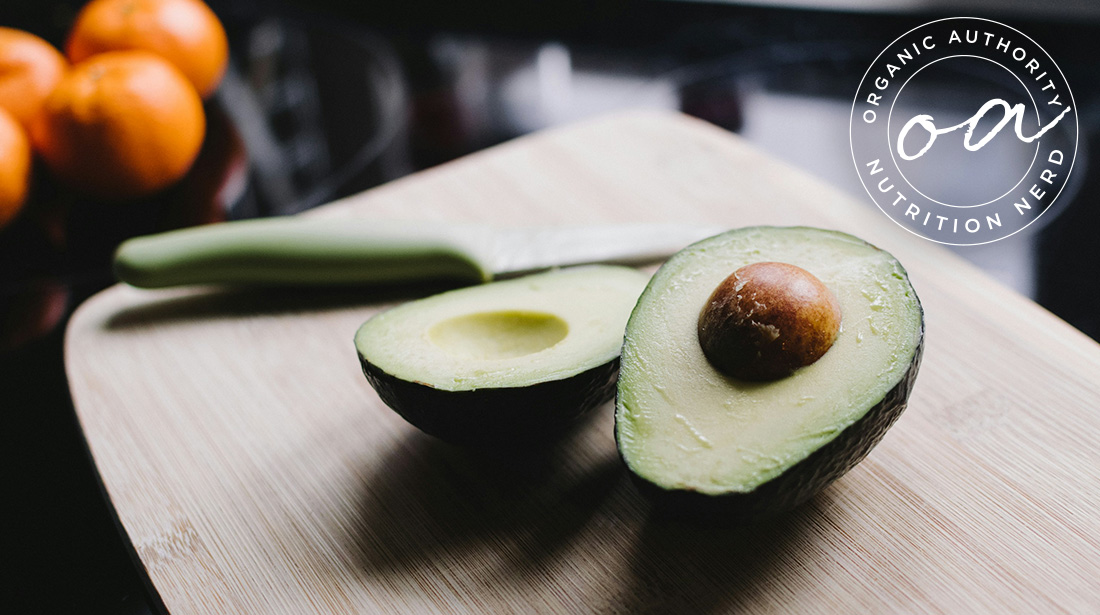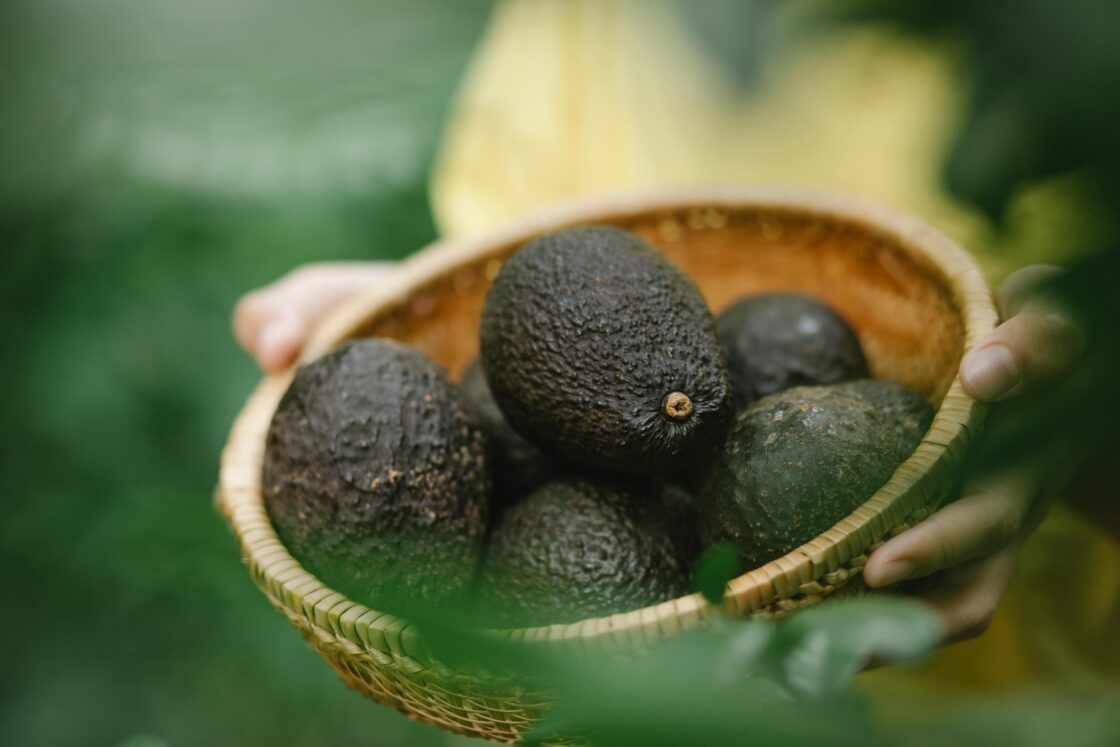Are Avocados Healthy or Just a Trend? A Full Nutritional Guide + 5 Recipes

When it comes to plant-based foods, avocados are a nutritional powerhouse. These delicious fruits are packed with healthy fats, antioxidants, minerals, and fiber.
Although avocado is commonly used in savory dishes or as a topping or filling for tacos, sandwiches, and salads, avocados are actually a single-seeded fruit1. This designation reflects its versatility — they’re just as delicious in guacamole as they are in baked goods and hearty avocado breakfasts. They’re also great as a dairy-free alternative to sour cream, and mashed avocado can provide a creamy texture to pudding, smoothies, and mousse recipes (plus, it’s vegan!).
Keep reading to learn more about the nutritional properties of avocados, the health benefits of avocados, and tips on how to incorporate them in your diet.
Harboring nutrition nerd tendencies? Sign up for the newsletter for more well-researched nutrition, non-toxic living guidance, and smart wellness advice.
How Healthy Are Avocados? A Nutritional Breakdown

Let’s start this discussion with a breakdown of the nutrients in avocado. According to the United States Department of Agriculture’s FoodData Central, one average-sized raw avocado (around 201 grams) contains2:
- 322 calories
- 4.02 grams (g) protein
- 29.5 g total fat
- 4.28 g saturated fat
- 19.7 g monounsaturated fat
- 3.66 g polyunsaturated fat
- 1.86 g other fat
- 17.1 g carbohydrates
- 13.5 g fiber
- 1.33 g sugar
- 2.27 g of other starch
- 1.1 milligrams (mg) iron
- 4.16 mg vitamin E
- 42.2 micrograms (mcg) vitamin K
- 20.1 mg vitamin C
- 58.3 mg magnesium
- 975 mg potassium
- 105 mg phosphorus
- 14.1 mg sodium
- 163 mcg of folate
- 0.382 mg copper
While avocados are high in fats, they mostly contain monounsaturated fat, or “healthy” fat. These fats can help to maintain healthy cholesterol levels, as opposed to saturated and trans fats.
Is There a Difference in Nutritional Value of Organic vs. Conventional Avocados?

Other than the environmental impact (we’ll touch on this more later!), is there a nutritional reason to go for organic avocados over conventional?
Although there’s not too much research to be found on this topic, West Pak Avocado, Inc. reports that organic avocados may have lower pesticide exposure. The EWG came to the same conclusion, rating avocados in their number one spot on the EWG Clean 15 list, as opposed to the fruits and veg on the Dirty Dozen, which have more pesticide residue. This is a big win, with pesticides being linked to an increased risk of cancers and conditions like Parkinson’s Disease.
However, organic avocados could also contain higher levels of certain nutrients like iron, magnesium, and vitamin C as compared to conventional produce 3, 4.
Key Health Benefits

Avocado’s nutrient-dense profile means it can provide many health benefits to a variety of systems in the body. They’re not just a trend — here’s how you can stand to gain from eating more avo toast.
Heart Health Benefits
The most well-known system positively impacted by avocado is the heart. A 2022 study by the Journal of the American Heart Association reports that replacing one-half a serving per day of margarine, butter, egg, yogurt, cheese, or processed meats with the equivalent amount of avocado was associated with a 16 to 22 percent lower risk of cardiovascular disease5.
Furthermore, a 2023 study review in the journal Cureus reported that diets that included regular intake of avocado were linked with decreases in LDL levels (unhealthy cholesterol)6. A 2025 study by the Journal of the American Heart Association found that adding one avocado a day for 26 weeks can improve diet quality, sleep, and blood lipid levels7. Finally, a 2023 study in the British Journal of Nutrition reported that consuming 5+ servings of avocado per week was associated with a 17 percent reduction in risk of hypertension8.
These heart health benefits may be a result of the anti-inflammatory benefits from compounds in avocado juice9.
Digestive Health Benefits
Avocados are a rich source of fiber, making them an ideal food to support gut health.
Along with fiber, avocado also offers gut microbiome support. A 2025 randomized controlled trial revealed that eating avocado can help increase gut microbiome diversity, with its prebiotic potential more pronounced in those with a poor diet at baseline. A 2020 study also showed that eating an avocado daily can help improve levels of short chain fatty acids in the body, which are beneficial to metabolic health.
Finally, avocados play an important role in natural detoxification processes in the body. A 2019 study in the journal Antioxidants reported that avocados contain a significantly higher amount of an antioxidant compound called glutathione compared to other fruits. Glutathione plays a major role in helping to reduce oxidative stress in the body and in detoxification pathways10.
Weight Management Benefits
Avocados, as mentioned earlier, have a rich fiber content — which can increase satiety and reduce hunger, ultimately helping you better manage your weight11. A 2025 study of Latina women found that eating avocados regularly can help you adhere better to dietary interventions, which could also help you manage weight12.
In addition to these factors, avocado intake may help you manage weight by supporting metabolic health. A 2022 study in the Journal of Nutrition looked at the effect of replacing avocado energy for carbohydrate energy in free-living adults who are overweight or obese and have insulin resistance.
The results showed that eating avocado regularly can support healthier dietary patterns that can also help improve glucose control and reduce biomarkers of heart health risk13. Furthermore, a 2025 study in the journal Current Medical Science reports that the benefits of avocado oil may include enhanced glycemic control and lipid metabolism due to their monounsaturated fat content14.
Cognitive and Mental Health Benefits

Believe it or not, avocado can also support brain and mental health. In fact, a 2020 study in the journal Nutrients reports that the carotenoids, vitamin C, B vitamins, and polyphenols found in certain fruits and vegetables like avocado can support mental health15. And further research shows that avocado may also support brain health.
A 2020 study in the International Journal of Psychophysiology looked at the impact of eating avocado daily for twelve weeks in adults. The results of the study found that eating avocados daily helped improve performance in attentional inhibition16. A 2021 review in the journal Frontiers of Nutrition also found that avocado consumption was related to an increased average score in cognitive tests, as well as better immediate and delayed recall17.
Benefits for Specific Populations
Avocado intake can benefit the health of just about everyone, but it’s especially helpful to fetal development and the aging population. A 2025 study in the journal Pediatric Research reports that avocado intake during pregnancy is found to lead to lower odds of infant food allergies at 12 months18.
When it comes to the aging population, the antioxidant levels in avocado and avocado oil can help lessen the risk of age-related health conditions like heart disease and type 2 diabetes19. A 2022 study in the Journal of Cosmetic Dermatology also found that daily avocado intake may lead to enhanced firmness and elasticity of the facial skin of healthy women20. Finally, a 2016 review in the journal Advances in Neurobiology reports that the antioxidants in avocado may help prevent or treat neurodegenerative diseases in older adults21.
And of course, eating avocado on a regular basis can help prevent or manage chronic diseases like certain cancers, type 2 diabetes, and heart disease, so the fruit may especially benefit those who are susceptible to these conditions7. Not only that, but it may also benefit those with osteoarthritis pain, osteoporosis, as well as certain eye health conditions11,22..
Incorporating Avocados Into Your Diet

So how much avocado do you need to eat to reap the benefits? Although many of the mentioned studies are focused on people eating one avocado daily, that serving size may not be sustainable for everyone. Experts at the Mayo Clinic suggest that eating just two avocados per week can help provide heart health benefits such as lower cholesterol23.
You’re probably not struggling to figure out what to make with avocado, but it’s still fun to try a variety of recipes with avocado to get your two servings per week. It’s delicious mashed as part of guacamole, smoothies, or dips, but also great as a topping for grain bowls. To get you started, here are a few of our favorite healthy avocado recipes to help you to get your weekly dose.
Have a favorite avocado recipe? Share with the community in the comments below.
Recipe: Avocado Toast with Lemon and Chili
One popular and simple way to incorporate avocado into your daily routine is via the popular avocado toast trend. Simply toast your favorite bread and top it with sliced or mashed avocado along with a sprinkle of your favorite herbs and spices. Try adding an egg to your toast for added protein, or top with more veggies like sliced tomato or onion for extra fiber.

Recipe: Raw Chocolate Avocado Smoothie
This drink has all the delicious flavors of a classic milkshake, but with the antioxidants and health benefits of a fruit smoothie. There are a lot of avocado smoothie recipes out there, but we love this one for its rich chocolate flavor. Add raw honey for sweetness and blend with your favorite nut milk until creamy!

Recipe: 5-Ingredient Avocado Salad
This fresh summery salad is a dip, relish, and a meal all at once — and it’s unbelievably easy to whip up. Enjoy it on its own, as a side at a barbecue, or served over grilled proteins for a bright layer of zingy vegetables.

Recipe: Healthy Avocado Hummus
Add avocado to your typical chickpea hummus for a fresh, creamy twist on a classic. Serve with chips or crudités of your choice for a delicious snack that’s great for dinner parties or a casual lunch.

Recipe: Black Bean Veggie Burger with Avocado
Avocado isn’t exactly the star of this burger, but that’s because it’s got an all-star cast of ingredients. Sliced avocado makes the perfect topping for this meatless burger featuring black beans, jalapeños, caramelized onions, and blistered kale.

Flavor or texture of avocado not for you? Reap some benefits of the fruit by using avocado oil in place of your usual vegetable oil or butter when cooking on the stovetop or roasting vegetables in the oven.
The Environmental Impact of Avocados
One thing to be conscious of if you’re considering ramping up your avocado consumption is, the environmental impact. A 2021 review in the journal Ambio reports that deforestation may occur with expansion of avocado harvest in certain regions in Mexico24. Growing avocados also involves using a lot of water, and the impacts of climate change and the availability of natural resources have made many regions less suitable for growing avocados. Finally, avocados can create a significant carbon footprint if they have to be transported on long journeys to get to the consumer25.
Despite the numerous health benefits avocados can offer, some consumers may choose to minimize their avocado toast habit to lessen such environmental impacts.
You can also engage in certain purchasing behaviors to help encourage sustainable avocado harvesting practices, like:
- Look for certifications: Choose avocados that are labeled with certifications like USDA Organic, Fair Trade, Non-GMO Project Verified, or The Rainforest Alliance.
- Support local or regional producers: Purchase avocados grown and harvested as close to your local area as possible to reduce transportation emissions.
- Consider seasonality: Since avocados are a tropical fruit, choosing to eat them only when they are in season can help lessen the energy-intensive storage and transportation of avocados. In the United States, avocados are only in season from spring to late summer or early fall in California. South Florida is an exception, where avocados are in season from June through January26. Avocados are in season pretty much year-round in Mexico, but we’ll soon likely see increased prices on these avocados due to import tariffs.
How Do You Know When an Avocado Is Ripe?
With the price of this healthy fruit rising every day, there’s no worse feeling than slicing into a certified organic avocado from the farmer’s market and realizing it’s not ripe yet. Here are our top tips on how to tell if your avocado is ready to eat based on color and texture.
Experts from the journal Foods report that after harvest, the pigment of a Hass avocado will change from a light green color to a purplish black An unripe avocado will have a very firm texture, whereas a Hass avocado starting to ripen will be quite soft to the touch.
Here’s how to tell where your avocado is at in the ripening process based on color:
- Light, vibrant green: Unripe
- Greenish purple: Ready for slicing, but may resist mashing
- Consistent dark green-purple: Peak ripeness, perfect for mashing
- Brown spots: Likely overripe, may no longer be optimal for consumption
To speed up the ripening process for bright green avocados, keep them at room temperature or place them in direct sunlight. You can also try placing them in a paper bag with an ethylene-producing fruit like a banana or apple. If your avocado is already close to optimal ripeness but you want to save them for a salad you’re preparing tomorrow, slow down the ripening process by placing it in the refrigerator.
If you know you won’t use the whole avocado fruit at once, it’s important to know how to properly store it once you slice it open. To prevent the browning of the avocado flesh, you can use lemon juice to keep the fruit fresh or vacuum seal the leftover sliced avocado28.
If you don’t plan on using your avocado for quite some time, simply freeze the whole fruit or any leftover slices to inhibit browning for up to a few months until you’re ready to use it29.
FAQ
Yes, research shows that eating an avocado every day can provide a wealth of health benefits, from lowering cholesterol to reducing your risk of heart disease and type 2 diabetes over time6, 13. Be sure to include avocados as part of a varied and balanced diet
Research so far has not conclusively shown that eating avocados can help with weight loss, but their fiber content may help you feel fuller for longer30,31. This, coupled with their metabolic health benefits, could ultimately help with weight management.
More importantly, including avocados as part of your daily routine may be able to improve the nutritional quality of your diet. No single food item can help you lose weight. A variety of nutrient-dense foods as part of a balanced eating plan along with a consistent exercise routine is recommended for optimal weight loss efforts.
Due to their low sugar and high fiber content, avocados can be a healthy part of a diabetes-friendly diet. Research shows that eating avocado fruit regularly can help lower risk of diabetes by improving glycemic control and managing lipid levels in the body33, 34.
Conclusion
In conclusion, avocados are a versatile and delicious fruit that are best enjoyed when ripe and in moderation, especially when taking environmental factors into account. For optimal nutritional benefits, be sure to check the label on your avocado for certified organic status. From heart health to gut health to metabolic health, avocados provide an array of health benefits that make eating this delicious fruit even more appealing.
Sources:
- https://pubchem.ncbi.nlm.nih.gov/taxonomy/3435
- https://fdc.nal.usda.gov/food-details/171705/nutrients
- https://www.westpakavocado.com/all-about-organics-at-west-pak-retail-guide/.
- https://pmc.ncbi.nlm.nih.gov/articles/PMC10814746/
- https://pubmed.ncbi.nlm.nih.gov/35352568/
- https://pubmed.ncbi.nlm.nih.gov/37525782/
- https://www.ahajournals.org/doi/10.1161/JAHA.124.039130
- https://pubmed.ncbi.nlm.nih.gov/35979778/
- https://pubmed.ncbi.nlm.nih.gov/40002333/
- https://www.mdpi.com/2076-3921/8/10/426
- https://pmc.ncbi.nlm.nih.gov/articles/PMC10340145/
- https://www.mdpi.com/2072-6643/17/2/367
- https://pmc.ncbi.nlm.nih.gov/articles/PMC9486596/
- https://pubmed.ncbi.nlm.nih.gov/39998768/
- https://pmc.ncbi.nlm.nih.gov/articles/PMC7019743/
- https://www.sciencedirect.com/science/article/pii/S0167876019305598
- https://www.frontiersin.org/journals/nutrition/articles/10.3389/fnut.2021.746453/full
- https://www.nature.com/articles/s41390-025-03968-4
- https://pubmed.ncbi.nlm.nih.gov/40006059/
- https://pubmed.ncbi.nlm.nih.gov/35037373/
- https://pubmed.ncbi.nlm.nih.gov/27651262/
- https://pubmed.ncbi.nlm.nih.gov/29857819/
- https://www.mayoclinic.org/diseases-conditions/high-blood-cholesterol/in-depth/cholesterol/art-20045192
- https://pmc.ncbi.nlm.nih.gov/articles/PMC8651965/#Sec7
- https://link.springer.com/article/10.1007/s00267-024-02009-w
- https://californiaavocado.com/avocado101/are-california-avocados-available-year-round/
- https://pmc.ncbi.nlm.nih.gov/articles/PMC11049431/
- https://pmc.ncbi.nlm.nih.gov/articles/PMC8839884/
- https://pubmed.ncbi.nlm.nih.gov/38604012/
- https://pubmed.ncbi.nlm.nih.gov/39861497/
- https://www.sciencedirect.com/science/article/abs/pii/S0271531722000203
- https://www.sciencedirect.com/science/article/pii/S1871402123000553
- https://pubmed.ncbi.nlm.nih.gov/38648888/
- https://pubmed.ncbi.nlm.nih.gov/39998768/


